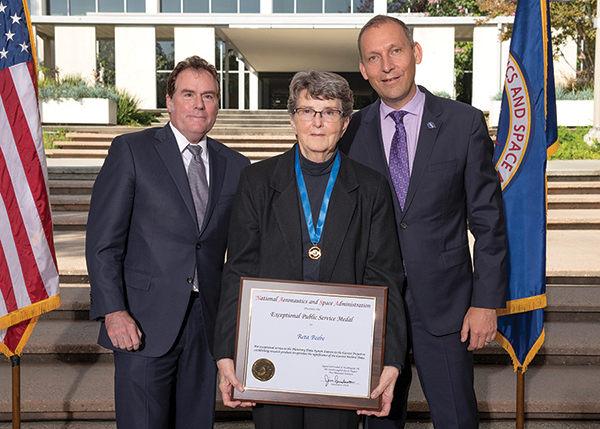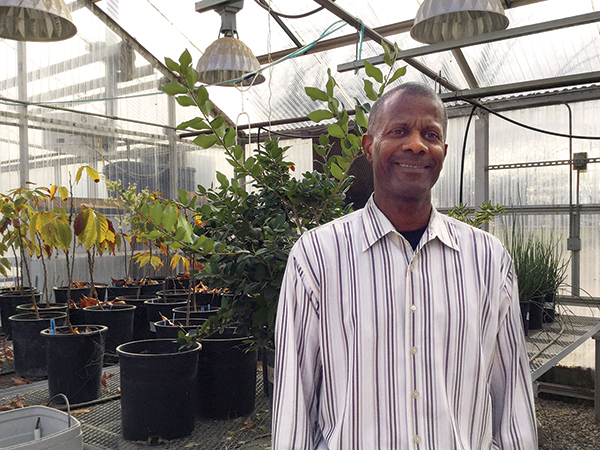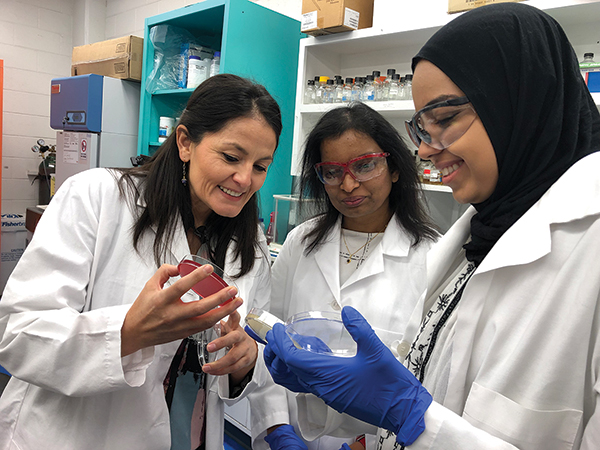The romance of space can’t compare to the value of data – just ask NMSU Astronomy Professor Emerita Reta Beebe (center). In 2019, Beebe received NASA’s Exceptional Public Service Medal for a second time for her expertise in archiving and making available worldwide all of the atmosphere-focused data returned by the Cassini mission to Saturn.
The Cassini–Huygens space-research mission, commonly called Cassini, was the fourth space probe to visit Saturn. Beebe’s 2019 NASA medal was for her work in coordinating the archiving of the Cassini data set to optimize access for current and future users. In 2010, she received the medal for her extensive service to the community, working on advanced planning and program reviews for NASA and the National Academy of Sciences.
“The Cassini Project and NASA owe Dr. Beebe a huge debt of gratitude for her ideas and support to enable the future for Cassini science research by planetary scientists, especially the next generation,” says Jon Holtzman, NMSU astronomy department head.
Minerva Baumann ’13
More than 20 years ago, Rolston St. Hilaire joined the American Society for Horticulture Science as a graduate student. Now, he is an inductee of the society’s 2019 class of fellows.
St. Hilaire, head of the Department of Plant and Environmental Sciences and a professor in the College of Agricultural, Consumer and Environmental Sciences, has published more than 130 publications. As an assistant professor, he developed six new courses related to landscape, ornamental horticulture and environmental stress physiology.
St. Hilaire also has contributed extensively to international horticulture. He has presented research findings at scientific conferences in Canada, Italy and Mexico and mentored and/or recruited graduate students from India, Iran, Jordan, Pakistan and Trinidad.
Currently, he serves as the ASHS International Division vice president, overseeing professional interest groups that deal with horticulture topics internationally, and ensuring that there are scientific talks, workshops and oral sessions to provide more information to scientists wishing to learn more about international horticulture. The ASHS is recognized around the world as one of the most respected and influential professional societies for horticultural scientists.
Melissa Rutter ’17
Biochemistry professor Paola Mera (left) investigates the mechanisms that guide how tiny life forms known as bacteria grow and reproduce. The long-term goal of Mera’s lab is to create ways to attack antibiotic-resistance, considered one of the biggest health challenges of our time. Mera’s $1.5 million grant from the National Institutes of Health will fund the equipment and manpower to help her team take their recent discoveries to the next level.
“We have exciting data that show the molecular machines that are involved in copying the bacterium’s chromosome and the machines involved in segregating the chromosomes are talking to each other,” Mera says. “And they’re talking not only in one direction, but they’re talking in two directions.”
By decoding the mechanisms involved in this essential communication for bacteria, the Mera lab can identify new targets for the design of effective drugs that interrupt the growth of antibiotic-resistant bacteria.
Minerva Baumann ’13

Beebe (center)

St. Hilaire

Mera (left)

Dove Hall, Room 212
305 N. Horseshoe Drive
Las Cruces, NM 88003